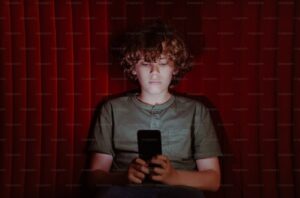The NSPCC has asked parents and young people how they feel about the impact of smartphones and social media on child safety and wellbeing.
 Young people told the NSPCC that they feel trying to keep them away from smartphones and social media was unrealistic in an online world, and that having a phone to communicate with made them feel safer.
Young people told the NSPCC that they feel trying to keep them away from smartphones and social media was unrealistic in an online world, and that having a phone to communicate with made them feel safer.
Meanwhile, parents also felt that smartphones had value in their child’s lives but worried about some of their uses.
Both parents and children felt that tech firms should be made to do more to ensure child safety online rather than the onus being on parents and children to look out for the pitfalls of smartphones and social media.
The national children’s charity agrees that “online platforms and services should be designed with their safety in mind” and is fighting to change the “unacceptable levels of harm and abuse” children still face in the digital world.
Online youth group shares perspectives on owning smartphones
 The NSPCC spoke to its Voice of Online Youth and Young People’s Board for Change to find out their views on smartphones and social media.
The NSPCC spoke to its Voice of Online Youth and Young People’s Board for Change to find out their views on smartphones and social media.
The charity also spoke to parents and carers as part of their community work and polled parents on online safety issues.
Online safety expert and the NSPCC’s Associate Head of Child Safety Online, Kate Edwards, leads on developing the charity’s Child Safety Online strategy and providing advice for parents.
When asked about owning a smartphone, children said:
- They should be able to access the online world before becoming adults to enable them to learn how to use smartphones safely
- Smartphones allow them to stay connected, check travel times and have fun
- Phones feel vital for their safety, allowing them to contact family in an emergency
- Banning children from having smartphones would just encourage secrecy, and many children could still access social media on laptops and tablets anyway
- It was helpful to have restrictions on their first phone, such as parental controls and restricted access to games or apps, although they may not have felt this way at the time
- Some children did feel that owning a phone with limited capabilities first before getting a smartphone would have benefited them
- Some autistic children said they often found it easier to communicate by text, as they may experience more difficulties with communicating verbally or in person
Parents struggle to find the right balance with smartphones
 Meanwhile, parents also valued being able to stay in contact with their child and afford them some independence, but worried about the content their children may access and admitted they struggled to find a balance that would keep their child safe.
Meanwhile, parents also valued being able to stay in contact with their child and afford them some independence, but worried about the content their children may access and admitted they struggled to find a balance that would keep their child safe.
Parents also said smartphones provided children with vital access to advice from professionals, helplines and support services. But they worried about children using smartphones to livestream, meet new people and share content online.
Some said taking smartphones away from children and young people was a “cop out” and that more responsibility needs to be placed on tech companies to make them safer.
When it comes to research in this field, the results are inconclusive.
Research from Northumbria University (2021) does suggest that children and young people can struggle to separate problematic use of smartphones from functional and enjoyable use, particularly “when smartphones are embedded so deeply in modern life.”
Meanwhile, a review of evidence into smartphones policies in schools, carried out by The London School of Economics (LSE) this year, found there was too little evidence to recommend an effective approach for all students as a whole or for children of different ages. It said that, while several studies show improved academic performance when smartphone use is restricted, especially for less advantaged children, there were too few studies to draw conclusions.
Preventing access to social media unrealistic in a digital world
When it came to accessing social media, children and young people told the NSPCC:
- They would miss out on opportunities, including learning, if they were denied access
- It is an essential tool to enable them to connect, build relationships and communicate
- Now that we live in a digital world, preventing access to social media for children would be very hard to enforce
- Not all content they are exposed to on social media is good, and some holds no value
- They were concerned about online hate accounts and forums targeting individuals and sharing racial slurs and abuse
- They feel disappointed when they report inappropriate or harmful content to social media platforms and no action is taken
 Parents were generally happy for their children to use social media apps to maintain connections with people they already know, but they worry about other ways that social media can be used, particularly in relation to connecting with strangers. Most felt more comfortable if parental controls or supervision were in place.
Parents were generally happy for their children to use social media apps to maintain connections with people they already know, but they worry about other ways that social media can be used, particularly in relation to connecting with strangers. Most felt more comfortable if parental controls or supervision were in place.
However, parents are concerned about the lack of critical thinking, particularly with short form content shared online. They were also worried about their children viewing misinformation and hateful content, including racism and misogynistic content, on social media.
Link between social media use and poor mental health unclear
Again, studies on the impact of social media on children and young people are inconclusive.
 Some studies have found an association between high levels of social media use and poor mental health, while others have found that moderate use of social media can be linked to improved wellbeing. Young people can benefit from increased connections, identity development and social support. Some evidence suggests that either very minimal or very excessive use of social media can be strongly associated with negative wellbeing.
Some studies have found an association between high levels of social media use and poor mental health, while others have found that moderate use of social media can be linked to improved wellbeing. Young people can benefit from increased connections, identity development and social support. Some evidence suggests that either very minimal or very excessive use of social media can be strongly associated with negative wellbeing.
Research is also unable to pinpoint a ‘right’ age to start social media use. Some studies have reported a stronger association between social media use and worse mental health for younger users but others have found “no significant age effect.”
Smartphone technology “too significant” to prevent access
The NSPCC also asked children and young people about the impact of technology on their mental health and wellbeing. The children said:
- Poor mental health is a growing issue but social media itself was not always the root cause, with some children explaining that it is often other social media users “that exacerbates the issues you already have.”
- Social media and online advertising did impact how they felt about themselves and the choices they made. Many were particularly concerned about the pressure it puts on girls to look a certain way
- Some children felt that the online world was too significant a part of modern life to prevent access for children, and that any safety concerns could be managed or prevented
- Some autistic young people said that being online was often the only thing available for them to do
Parents concerned about impact of technology on mental health
Parents, meanwhile, are very concerned about the impact that technology may have on the mental health and wellbeing of their children, and wanted more support in this area.
Parents said they were worried about:
- The amount of time their child spends online and the impact that might have. Many were not sure how long was appropriate for their child to spend online
- Addictive design features that encourage children to spend longer online than they would like
- A big incident happening online that would impact their child’s future, from the content they view to what they share online
- The lack of critical thinking for young people when they view content online
 Internet Matter’s Children’s Digital Wellbeing Index found that almost two thirds of parents (63%) believe that spending time online negatively impacts their child’s mental health and wellbeing. However, almost the same number of children (65%) said spending time online made them feel mostly happy.
Internet Matter’s Children’s Digital Wellbeing Index found that almost two thirds of parents (63%) believe that spending time online negatively impacts their child’s mental health and wellbeing. However, almost the same number of children (65%) said spending time online made them feel mostly happy.
Other studies are inconclusive. The Royal College of Paediatrics and Child Health (RCPCH) state that there is “not enough evidence to confirm that screen time is in itself harmful to child health at any age, making it impossible to recommend age-appropriate time limits.”
A report from the American Academy of Pediatrics also found that, ultimately, the impact of social media on wellbeing was varied and dependent on the individual experience.
They explained that “some symptoms of poor mental health, like feelings of sadness or isolation, might drive you to use social media more, which in turn shapes how you engage with content online. Social media’s effect on wellbeing will depend on the balance of negative and positive interactions and content that you experience on these platforms.”
Meanwhile, Youth Skills, a European project (2020-23), carried out research with young people aged 12-17 to explore how children’s digital skills may benefit their wellbeing. They found that acquiring digital skills can boost children’s communication skills and mean children feel better supported by their friends.
However, the researchers also found that spending more time online could make children feel lonelier.
The NSPCC wants to make smartphones and social media safer for children
Acknowledging that we live in an online world, the NSPCC believes that children have the right to feel safe and happy in digital spaces.
They say this isn’t always happening because not all online platforms are designed with their safety in mind, meaning they are often subjected to harm and abuse. The charity is working hard in 3 areas to make the online world safer for children:
- They are campaigning for tech firms to design their platforms with children’s safety in mind and to take urgent action to deal with harm and abuse. They are also supporting Ofcom in their new role as the online regulator, responding to their consultations and providing them with insights from their work with children and young people
- They are working with children and young people to understand what they need from online platforms and sharing these insights with the technology sector
- They are educating children, young people, parents, carers and professionals about online safety
Kate Edwards concludes her NSPCC report into smartphones and social media use with the following words:
“Every family is different, and every child will develop their own take on social media and smartphones. As parents and carers, it’s important to stay aware of the risks and challenges that being online and using the latest technology pose.
“For more ideas about how to be confidently online as a family, check out our online safety information and advice.”
Being aware of the health, safety and wellbeing risks children face
 First Response Training (FRT) is a leading national training provider delivering courses in subjects such as health and safety, first aid, fire safety, manual handling, food hygiene, mental health, health and social care, safeguarding and more.
First Response Training (FRT) is a leading national training provider delivering courses in subjects such as health and safety, first aid, fire safety, manual handling, food hygiene, mental health, health and social care, safeguarding and more.
They work with a large number of early years and childcare providers, as well as schools, colleges, and children’s services.
Their training courses include Paediatric First Aid, Safeguarding Children and Youth Mental Health First Aid. They also deliver courses in topics such as Understanding Mental Health and Anxiety Awareness.
A trainer from FRT says:
“We see so much reported about how smartphones, social media and screen time are damaging children and young people, impacting their behaviour, academic and achievement and eradicating their mental health and wellbeing. It’s no surprise that parents and carers are so worried about this issue and mindful about getting it ‘right’.
“That’s why it’s so important that organisations such as the NSPCC are providing up to date advice and guidance for parents and carers and are working so hard to make the online world safer for children.
“It’s something we can all be aware of. Safeguarding children in today’s world means protecting them off and online. It’s so important that we are mindful of the harms they could be exposed to online and that there are mechanisms in place to protect them, and to offer them help and support when they need it most.”
For more information on the training that FRT can provide, please call them today on freephone 0800 310 2300 or send an e-mail to info@firstresponsetraining.com.
